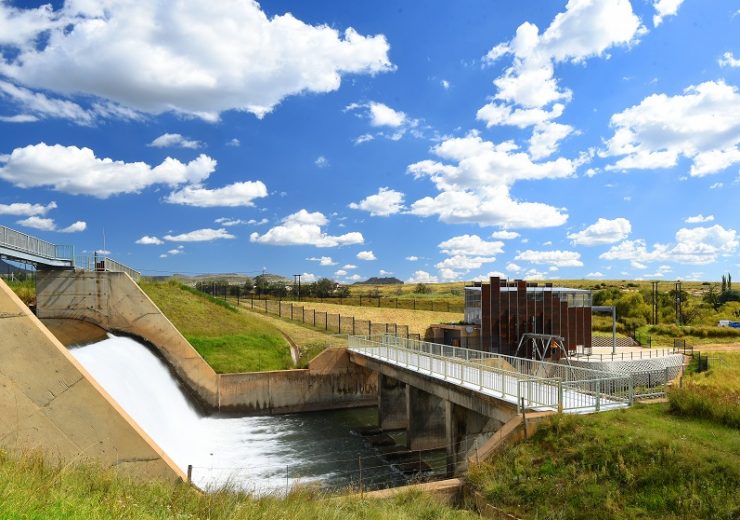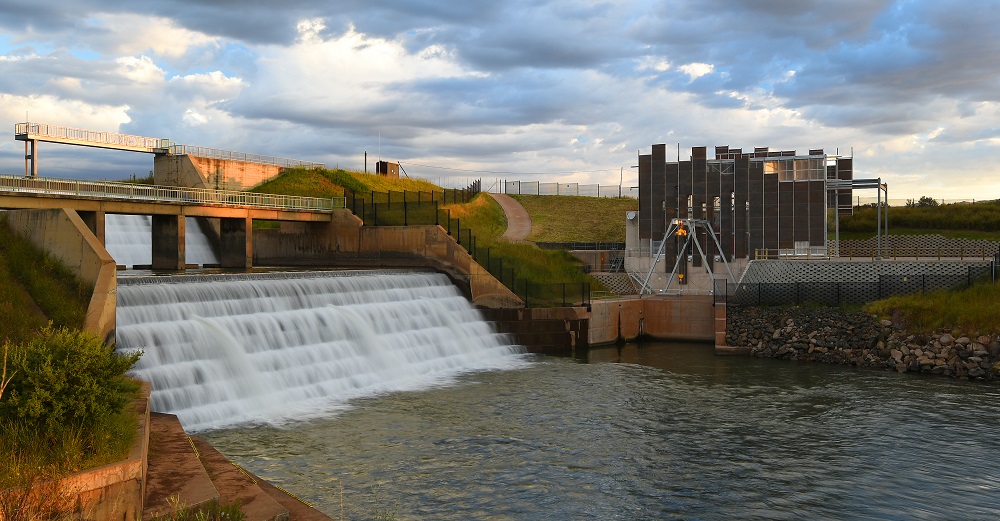The 4.2MW hydro plant in South Africa was the first of its kind to have its ESG assessment conducted remotely due to pandemic travel restrictions

(Credit: Stortemelk Hydro/REH Group)
A small hydropower plant in South Africa has still been able to gain ESG accreditation in the pursuit of sustainable project development, despite the ongoing Covid-19 pandemic. International Water Power & Dam Construction (IWP&DC) magazine takes a closer look at the Stortemelk hydropower project.
The Stortemelk hydropower project in South Africa has been recognised as an impressive example of sustainable small hydro development using an industry-leading assessment tool.
“We strongly believe in the role sustainable hydropower projects can play in achieving a decarbonised power sector. This is especially the case in Africa with its vast untapped hydro potential,” says Anton-Louis Olivier, CEO of REH Group which developed the project.
“Applying the Hydropower Sustainability Environmental, Social and Governance (ESG) Gap Analysis Tool at Stortemelk has demonstrated the high sustainability performance of this hydro plant against the leading global standard. The results are also guiding our project development activities across the region.”
The evaluation was supported through the Hydropower Sustainability ESG Assessment Fund managed by the International Hydropower Association (IHA) and financed by Switzerland’s State Secretariat for Economic Affairs (SECO).
Stortemelk hydropower project background
The 4.2MW Stortemelk hydropower plant was developed as a greenfield project by REH. A single vertical Kaplan turbine is installed in a powerhouse alongside the existing Botterkloof Dam, situated on the Ash River in the Free State province of South Africa.
The design provides a compact solution for the turbine, optimising the short penstock route while avoiding any adverse impact on existing structures – the power station had to be constructed between two existing dams without affecting their operations and stability.
Construction began during August 2014 and the project achieved commercial operation in July 2016. The project was implemented under an engineering, procurement and construction management (EPCM) structure with contracts being awarded to:
- Andritz Hydro and Indar Electrical for the plant’s turbine, generator and switchgear
- Aurecon South Africa for EPCM services
- Eigenbau for civil works construction
- REH for operation and maintenance services
Connected to the national grid via a dedicated 10km 22KV interconnection, the run-of-river plant generates around 27GWh/annum and is expected to mitigate around 500,000 tonnes of CO2 emissions over a 20-year period. This is equivalent to the annual electricity use of around 4,200 homes over the same period.
IHA assessment and findings
REH has been a member of the International Hydropower Association for a number of years. In 2019, CEO Anton-Louis Olivier was elected to the board as one of two members representing the African region.
This increased REH’s awareness of the significant scope for hydropower development in Africa in order to support expansion of the continent’s power sector in a clean and renewable manner, along with the need to ensure that all future hydropower plants on the continent are developed and operated in a socially and environmentally sustainable manner.
The Stortemelk Hydro plant has always exemplified the benefits of REH’s technical and financial approach to its hydropower developments and the company wanted to see how the project also measured up on ESG principles.
In addition, with the growth of green or ESG financing internationally, financial institutions increasingly rely on benchmarks such as the IHA’s sustainability ESG tool as part of their assessment process.
While the assessment was very useful internally to measure company performance and guide future developments, it is also seen as a step in positioning the project to access green financing in the future.
Indeed, REH believes it is important that there is greater awareness in Africa of the IHA, its tools and the benefits that it can bring to financiers, developers and owners.

In January 2021, it was announced that Stortemelk Hydro had achieved global good practice across ten ESG performance criteria in the independent assessment. The report concluded that the project’s social impact was kept to an absolute minimum with no relocation or economic impact on any individuals or community.
Despite its location in a conservation area, the impact on the natural environment was also minimal as it was sited next to an existing dam on a previously disturbed site.
The IHA’s accredited project assessor, Joerg Hartmann, says: “The assessment of the Stortemelk project really showed the power of smart siting and design choices. Because the project was built on an existing dam with a very small footprint, it has low impacts and enjoys broad stakeholder support.”
There were also substantial benefits for the local community through job creation and an ongoing socio-economic development programme. The plant generates enough electricity for around 3,000 households annually.
The two governance gaps that were identified related to public access to project documents and co-ordination with the national government regarding dam safety protocols on the adjacent dam structure.
If properly planned, constructed and operated, the ESG assessment shows that hydropower plants can have some of the lowest ESG impacts and highest levels of sustainability of any power generation technology.
Remote assessment
The ESG assessment at Stortemelk was the first of its kind which was carried out by a remote assessor. Due to travel restrictions around the Covid-19 epidemic, Joerg Hartmann, the IHA accredited assessor based in the US, was not able to visit the project in South Africa.
Hartmann determined beforehand that, due to the small size of the project and its low impact, a remote assessment could be viable.
The assessment was conducted in November 2020 and involved a review of 75 documents, 20 interviews and a remote site assessment using video calls, surveillance cameras and drone footage. REH supported the assessment by dedicating a member of staff in South Africa to assist with all video interviews with stakeholders as well as a virtual site visit using drone technology.
Hartmann and the IHA concluded that remote assessment methodology can work in specific cases and would be useful in increasing the accessibility of ESG assessments for smaller projects and developers.
Joao Costa, IHA’s Head of Sustainability, says: “The Stortemelk project is an excellent example of how such assessments are now able to be done remotely. It shows that it is possible to continue the pursuit of sustainable hydropower development even during a pandemic.
“IHA commends the resilience and professionalism of all who worked together to deliver this – the Hydropower Sustainability Assessment Council, SECO, REH Group, the accredited assessor and local stakeholders.
“In particular,” he adds, “the funding from SECO provides a strong financial incentive for project owners and developers to raise their social and environmental performance and develop their capacity.”
The full assessment report is available on the IHA website:
https://www.hydrosustainability.org/published-assessments/stortemelk
This article first appeared in International Water Power & Dam Construction magazine
